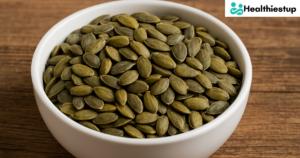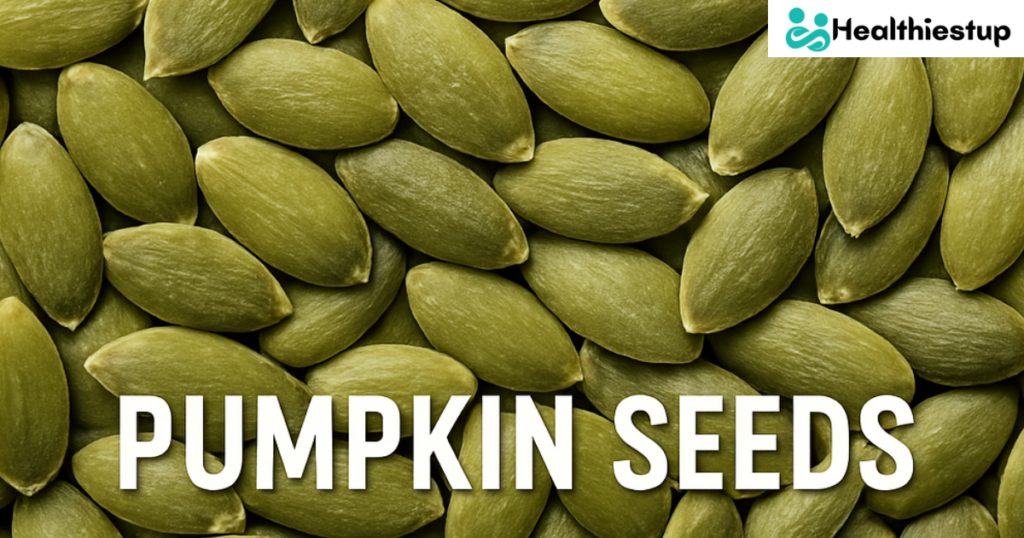Introduction
pumpkin seeds heart friendly: Pumpkin seeds, often overlooked as just a seasonal snack, are in fact one of the most powerful superfoods available. These tiny seeds are packed with essential nutrients, including heart-healthy fats, fiber, antioxidants, and vital minerals that support cardiovascular health. If you’re looking for a natural way to improve heart function, lower blood pressure, and enhance overall well-being, pumpkin seeds heart friendly and nutrient dense should be a staple in your diet.
Let’s dive deep into the incredible benefits of pumpkin seeds heart friendly and why they are the perfect superfood for heart health.
1. Nutritional Profile of Pumpkin Seeds
Pumpkin seeds heart friendly, also known as pepitas, are loaded with essential nutrients that contribute to heart health and overall wellness. Here’s what makes them a powerhouse of nutrition:
- Rich in Healthy Fats – Pumpkin seeds contain monounsaturated and polyunsaturated fats, which help lower bad cholesterol (LDL) and increase good cholesterol (HDL).
- High in Magnesium – Magnesium plays a crucial role in heart health, as it helps regulate blood pressure and prevent hypertension.
- Packed with Antioxidants – These seeds are full of antioxidants like carotenoids and vitamin E, which protect heart cells from oxidative stress and inflammation.
- Good Source of Fiber – Fiber helps reduce cholesterol levels, aids digestion, and supports weight management—factors that directly impact heart health.
- Protein-Packed – With about 19 grams of protein per 100 grams, pumpkin seeds help in muscle repair and satiety, reducing the risk of obesity-related heart diseases.
2. How Pumpkin Seeds Benefit Heart Health
A. Regulates Blood Pressure
One of the main risk factors for heart disease is high blood pressure, or hypertension. Pumpkin seeds are an excellent source of magnesium, which helps relax blood vessels, leading to improved blood flow and lower blood pressure levels. Regular consumption of magnesium-rich foods like pumpkin seeds can reduce the risk of hypertension.
B. Lowers Bad Cholesterol (LDL) and Boosts Good Cholesterol (HDL)
Pumpkin seeds contain plant sterols and healthy fats that help lower bad cholesterol (LDL) levels. At the same time, they increase good cholesterol (HDL), reducing the risk of clogged arteries and heart attacks.
C. Reduces Inflammation
Heart disease is made worse by chronic inflammation. The antioxidants in pumpkin seeds comb oxidative stress and reduce inflammation, which helps protect the heart from damage over time.
D. Supports Healthy Blood Sugar Levels
Unstable blood sugar levels can increase the risk of diabetes, a major factor in heart disease. The fiber and protein content in pumpkin seeds help regulate blood sugar, preventing spikes and crashes that may contribute to heart issues.
E. Improves Blood Circulation
Pumpkin seeds contain iron and copper, both of which play a significant role in oxygen transportation and circulation. Improved blood circulation helps in better heart function and reduces the risk of cardiovascular complications.
3. Additional Health Benefits of Pumpkin Seeds Heart Friendly
A. Supports Better Sleep and Stress Reduction
Pumpkin seeds are rich in tryptophan, an amino acid that promotes serotonin production, leading to better sleep and reduced stress both crucial for a healthy heart.
B. Aids in Weight Management
The A significant risk factor for heart disease is obesity. The high fiber and protein content in pumpkin seeds help keep you full longer, reducing unnecessary snacking and promoting healthy weight management.
C. Enhances Immune Function
The zinc content in pumpkin seeds supports immune health, protecting the body from infections and diseases that may indirectly impact heart health.
D. Strengthens Bone Health
Magnesium and phosphorus, present in high amounts in pumpkin seeds, contribute to strong bones, reducing the risk of osteoporosis, especially in aging individuals.
4. How to Incorporate Pumpkin Seeds Heart Friendly into Your Diet
The best thing about pumpkin seeds is their versatility. You can consume them in various ways to maximize their health benefits:
-
Snack on Them Raw or Roasted – Enjoy them as a crunchy and nutritious snack.
-
Add to Smoothies – Blend them into your morning smoothie for an added nutrient boost.
-
Sprinkle on Salads and Soups – Give your meals a delicious crunch and enhance their nutritional profile.
-
Mix with Yogurt or Oatmeal – A great way to start your day with a pumpkin seeds heart friendly breakfast.
-
Use as a Topping for Baked Goods – Add them to muffins, bread, or granola bars.
-
Make Pumpkin Seed Butter – A great alternative to peanut or almond butter.
-
Include in Homemade Trail Mix – Combine with nuts, dried fruits, and dark chocolate for a tasty snack.
5. Recommended Daily Intake of Pumpkin Seeds

To reap the benefits of pumpkin seeds are heart friendly, it’s recommended to consume about 1 ounce (28-30 grams) per day. This is roughly a small handful, providing a good balance of nutrients without excessive calorie intake.
6. Are There Any Side Effects?
While pumpkin seeds are incredibly healthy, it’s essential to consume them in moderation. Excessive consumption may lead to:
-
Digestive Issues – Due to their high fiber content, overeating can cause bloating or stomach discomfort.
-
High-Calorie Intake – Eating too many can lead to weight gain, which may counteract their heart benefits.
-
Allergic Reactions – Though rare, some people may be allergic to pumpkin seeds. If you experience any symptoms like itching or swelling, consult a doctor.
7. Choosing the Best Pumpkin Seeds
When buying pumpkin seeds heart friendly, look for:
-
Organic and Unsalted Varieties – Avoid added salt and artificial flavors.
-
Raw or Lightly Roasted – Over-roasted seeds may lose some of their nutritional value.
-
Proper Storage – Keep them in an airtight container in a cool, dark place to prevent rancidity.
Conclusion
Why Pumpkin Seeds Should Be a Part of Your Heart-Healthy Diet
Pumpkin seeds heart friendly superfood, offer numerous cardiovascular and overall health benefits. From lowering blood pressure and cholesterol to improving circulation and reducing inflammation, these small seeds pack a powerful nutritional punch.
Adding pumpkin seeds to your daily diet is an easy and delicious way to support heart health while enjoying a variety of other wellness benefits. So, next time you’re looking for a heart-healthy snack, grab a handful of pumpkin seeds heart friendly superfood your heart will thank you!
FAQs
Q1. Are pumpkin seeds good for heart health?
Yes, pumpkin seeds are rich in healthy fats, antioxidants, fiber, and magnesium, all of which help reduce blood pressure, lower cholesterol, and improve heart function.
Q2. Can pumpkin seeds lower blood pressure?
Yes, the magnesium in pumpkin seeds helps relax blood vessels and regulate blood pressure, reducing the risk of hypertension.
Q3. Are raw or roasted pumpkin seeds better for the heart?
Raw or lightly roasted pumpkin seeds are best, as excessive roasting may reduce their nutrient content. Choose unsalted, organic seeds for optimal benefits.
Q4. Are pumpkin seeds safe to eat every day?
Yes, they are safe in moderation. Eating about 1 ounce daily provides health benefits without excessive calorie intake.
Q5. Can pumpkin seeds improve blood circulation?
Yes, they contain iron and copper, which aid in oxygen transportation and enhance overall blood flow—essential for a healthy heart.
Q6. Can pumpkin seeds help with weight loss for heart health?
Yes, pumpkin seeds are high in protein and fiber, which promote satiety and help manage weight—an important factor in heart disease prevention.



